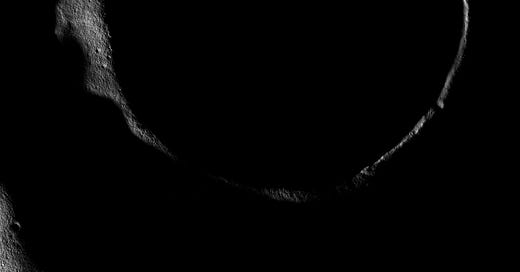Editor’s Note: Over the past few months, I’ve been studying Womanist and Feminists of Color Poets and their poems as a way to gather conflict resolution skills. If you are interested in knowing more about my findings, feel free to reply to this email. A Womb Called Darkness is a reflective piece of Poet, Activist & Storyteller Maya Angelou’s “The Mothering Blackness” poem and Rev., Womanist Theologian & Dr. Wil Gafney’s teachings on the intersection of Blackness and darkness. Upon reading both pieces, A Womb Called Darkness is a combination of a personal reflection, a continuation of this conversation, and an ode to our Teachers, Guides, and Storytellers who dare to use words to explore the dark places.
She came home running
back to the mothering blackness
deep in the smothering blackness
white tears icicle gold plains of her face
She came home running
She came down creeping
here to the black arms waiting
now to the warm heart waiting
rime of alien dreams befrosts her rich brown face
She came down creeping
She came home blameless
black yet as Hagar’s daughter
tall as was Sheba’s daughter
threats of northern winds die on the desert’s face
She came home blameless
-Maya Angelou, The Mothering Blackness
We live in a constant state of growing and shedding, learning and unlearning, moving and resting, strategizing and divesting, conversing and dreaming, in company and solitude, in joy and sorrow, in relief and pain.
This life, our lives, our sojourner period until our new home arrives, beckons us to join the rhythmic dance of old. If we so dare to study the movements, we may find that these nuanced phenomena require us to stretch beyond our created binaries and reframe our perception of life, death, and beyond.
This rhythmic dance of old heeds us to relook at the way we conceptualize Blackness and darkness.
The darkness engulfs us, creating womb-like environments for the weary. The darkness carves room for creativity and re-imagination. The darkness collects the tears unable to be shed in the daylight. The darkness provides relief, a cooling shade from the burning day. The darkness tends to our wounds, carefully, tenderly, and with Divine expertise.
It is a salve.
It is a protected waiting room.
It is a soft bed.
It is a cooling whisper.
It anoints.
It stills.
It nourishes.
It restores.
It is holy.
Reverend Dr. Wil Gafney, a Womanist Theologian, Biblical Scholar, and Episcopalian Priest, unpacks critical insight into the subject of Blackness and darkness. Gafney asserts,
Blackness is sacred. But the world has lost sight of the goodness and sanctity of blackness. That is why it is so easy to kill us and our children and so easy to justify our deaths with fear, fear of the dark.
Public Enemy prophesied rightly on Fear of A Black Planet. Fear of blackness. Fear of black people. All in service to a divinization of whiteness and light to the point of idolatry (Dec. 1, 2019).
In continuation, Bishop Steven Charleston, a Native American Elder, Academic, and Episcopalian Priest, on the subject of darkness, beautifully depicts that,
Heaven needs night. Darkness is not evil, but a realm of mystery and imagination. The day is constant, but the night is creative. The stars dance. The moon dreams. The comets write poetry of fire. Without the night there is no dawn or twilight, no moments of sacred ambiguity, no subtle changes of perception, no promises kept or just made, a holy pledge of healing or of hope.
No, please, we need the night in heaven. We need that glorious darkness, that obscure beauty, drifting on wedding gown clouds of white across an obsidian sky.
Now, reflecting upon Maya Angelou’s poem, The Mothering Blackness, takes a whole new meaning. In this seemingly three-part progression of what is a child, then tween, then grown woman, we see the importance of the smothering presence of Blackness and darkness.
Like a mother whose womb homed, nurtured, and created life over the span of 36 plus weeks, this physical womb now transcends into a metaphorical womb protecting and encompassing her own.
It is what we now know as the darkness. A quiet space. The determination to survive. Soaked pillows from endless cries. Dreams and conversations. Visions and mysteries revealed. A slowness. A stillness. A recovery.
This mothering Blackness and ultimately mothering darkness reminds us that there is restoration, healing, power, strength, and provision even in the darkest of moments.
-Chinyere




This was very timely for me. Thank you.